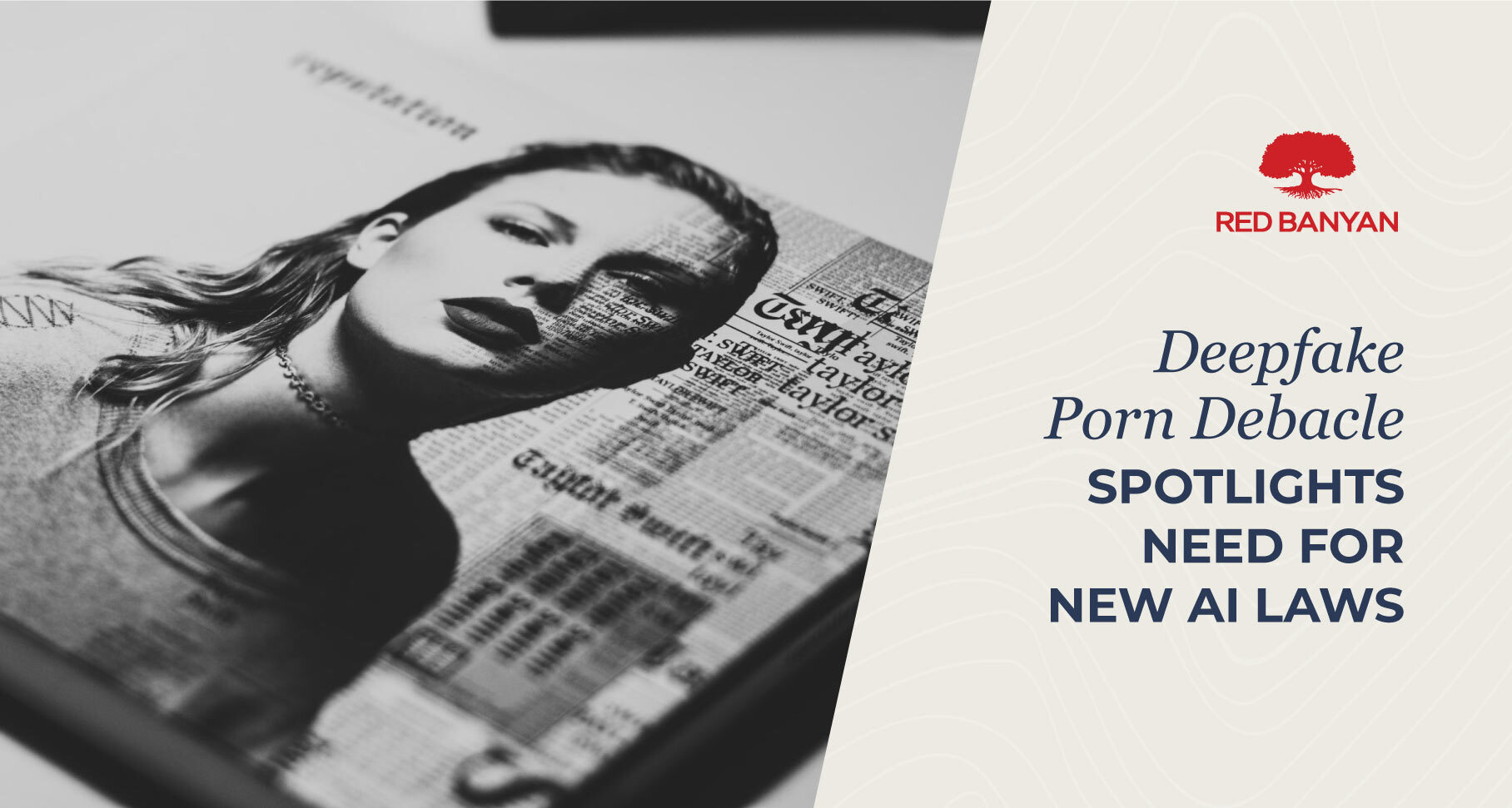Taylor Swift Deepfake Porn Debacle Spotlights Need for New AI Laws
February 2, 2024 | Category: AI, Artificial Intelligence, Blog, Branding, Crisis Communications, Crisis PR, Media Relations, Red Banyan, Reputation Management, Social Media

By Evan Nierman
The “Taylor Swift effect” may be the game changer that prompts federal lawmakers to seriously consider the growing threat of AI-generated porn and the need for strict new laws to address this problem.
The self-made billionaire and cultural icon has dominated the news since last week when a slew of digitally altered pornographic images of her likeness were shared online. The deepfakes were viewed millions of times before the social media platforms took action and began removing them. Expect legislators to look at the problem with fresh eyes owing to Swift’s unique standing as one of the most influential people on the planet.
According to an NBC report, the fake images generated more than 27 million views in 19 hours before the account that originally posted the sexually explicit content was suspended.
If this could happen to Taylor Swift, then it could happen to any one of us, even if most of us are far less likely to prompt Internet users to seek out our nude pics, whether real or computer-generated.
Billboard has accurately described Swift as “an advocate, a style icon, a marketing wiz, a prolific songwriter, a pusher of visual boundaries and a record-breaking road warrior.” Which explains in part why it’s not surprising that the megastar found herself smack in the crosshairs of an AI attack.
The silver lining to this sordid affair is that Swift’s mega-stardom may be the catalyst that motivates federal lawmakers to create new and far-reaching policies to help prevent this type of content from being shared with impunity.
Swift is uniquely positioned to shine a light on this problem. She has the financial means and international standing to call for action on a topic that would otherwise be much durther down on the list of AI issues that should be urgently addressed. Her staggeringly huge social media following of 278 million on Instagram and nearly 95 million on Twitter, reflects her status as an entertainment industry giant without peer.
Already, speculation is brewing that Swift will take some kind of legal action, though she has kept mum on the matter so far.
Currently, no federal laws exist that specifically address this kind of online harassment. Only 10 states have to date passed laws that address deepfake porn on some level.
That Swift has become embroiled in this controversy so early on will likely mean that the topic becomes an urgent focus of tech companies, policymakers, the media and the general public.
Expect to see an explosion of organizations and individuals becoming embroiled in litigation based on AI-generated content. The proliferation of deepfake still images and videos practically guarantee that we will soon develop a new cottage industry within the legal profession focused on this vexing challenge.
Deepfakes have already prompted disputes related to copyrighted text, music, and imagery, as well as entirely fake celebrity marketing campaigns and hoaxes such as the case involving a likeness of A-lister Tom Hanks being misused to advertise a dental plan.
These deepfakes, and the ones that have yet to be created, pose a huge reputation risk to all of us that underscores the urgency for new laws.
It is easy to see where this is headed. Imagine going to court where fake evidence is presented against you. In short order expect to hear about divorce proceeding polluted by fabricated “photos” of adulterous behavior or custody disputes impacted by AI-generated images depicting kids with injuries that never happened.
Copyright violations, invasions of privacy, and students being denied admission to colleges and universities based on inauthentic images that spread across the internet are likely to come to the fore.
It is easy to imagine bad actors posting embarrassing fake images online and then demanding payment for removing them from search engines. This repugnant practice has long favored by sites that prey upon the vulnerability of people by posting mugshots and then de-indexing them for a fee, only to have them pop up on other sites shortly thereafter as the vicious cycle continues anew. AI only makes the problem that much more serious.
The power and influence of Taylor Swift and her fanbase may be the impetus that provides the pressure and publicity needed to implement legal standards that will resolve or at least help contain this complex problem. Computer-generated images may be artificial, but their consequences real, which is why the time for new legal safeguards is now.
Evan Nierman is founder and CEO of the crisis communications firm Red Banyan and author of the books “Crisis Averted” and “The Cancel Culture Curse: From Rage to Redemption in a World Gone Mad.”

